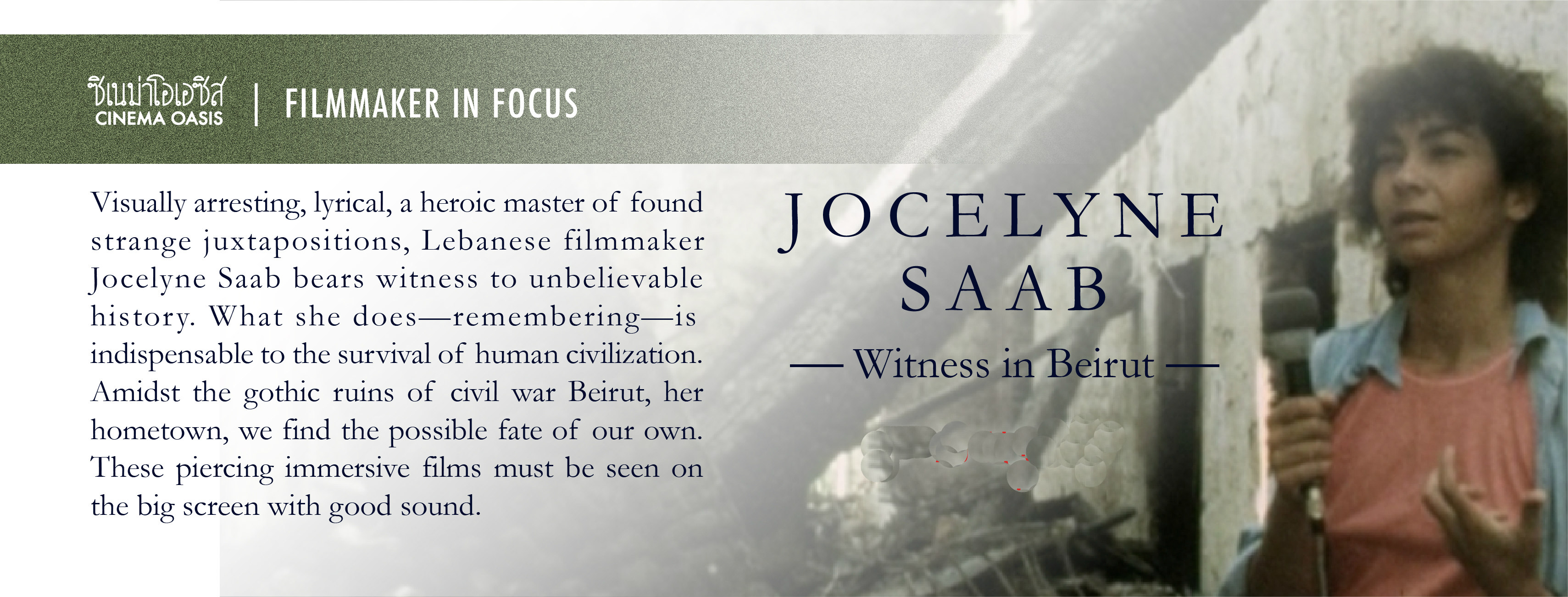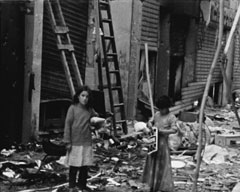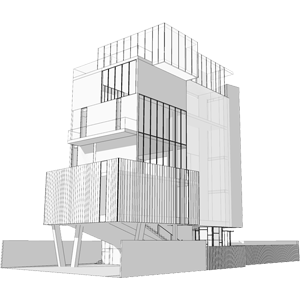Letter from Beirut + Beirut Never Again

—In loving memory of Director Jocelyne Saab—
Filmmaker in Focus :
Jocelyne Saab : Witness in Beirut
Visually arresting, lyrical, a heroic master of found strange juxtapositions, Lebanese filmmaker Jocelyne Saab bears witness to unbelievable history. What she does—remembering—is indispensable to the survival of human civilization. Amidst the gothic ruins of civil war Beirut, her hometown, we find the possible fate of our own. These piercing immersive films must be seen on the big screen with good sound.
……………………………………………………………..

In loving memory of Director Jocelyne Saab
Letter from Beirut
Lebanon/1978/48 min/digitized 16 mm
In English, Arabic, French with English subtitles
(Shown with ‘Beirut Never More’)
The vision of a beautiful soul: Lebanese filmmaker Jocelyne Saab, petite and very young, sits at a breezy seaside café, writing a letter from Beirut to the world. With lyrical situations and dreamlike images that deepen the unreality of colonial aggression and civil war in one’s own hometown, she takes us among the bullet-pocked and bomb-wrecked ruins, encountering Israeli tanks and international checkpoints by endless unlikely authorities, through the looking glass into a sun-dappled orange orchard, where a young Arafat, more like Che than the fat man we’re used to, holds a picnic for new revolutionaries at their swearing-in ceremony. She has returned to a country and a city that she no longer recognizes.
Jocelyne Saab: “Documentary and fiction co-exist here—their borderline melting away as Lebanon’s daily life is eroded by fictitious reality.”
Director: Jocelyne Saab
Cinematography: Olivier Gueneau
Editing: Philippe Gosselet
Sound Design: Paul Bertault
Songs: Oum Koulthoum, Marcel Khalife
Quoted Text: Etel Adnan
……………………………………………………………………………..

Beirut Never Again
Lebanon/1976/ 34 min/digitized 16 mm/ Color
In English, Arabic, French with English subtitles
(Shown with ‘Letter from Beirut’)
“One traveller out of two in the world had gone to Beirut, but the city doesn’t exist any more,” director Jocelyne Saab tells us as a young man sleeps by the roadside on a sofa, as militants roll by on a jeep and Beirut’s people go about their daily lives. A man walks down the street with his morning cup and his morning smoke, yet clearly vigilant; another passes with his life’s necessities: kerosene lamp, assault rifle and ripe tomatoes obtained somehow from somewhere; all surviving like feral cats amidst the rubble. The British Bank of the Middle East’s smoky façade looms like a genocidal crematorium over gangs of resourceful street urchins, fearless, born into war, who have no memory of normalcy.
Through projected pain & vented rage, non-living objects become charged with awful life. Saab’s dummy sequence is sensational, starting with images of the detritus of mod-cons: cracked TV, broken phone seemingly hurled in anger onto the street, dead typewriter, a melted vinyl record—and then the parade of maimed mannequins begin.
There is strange music in these visions: 3 militia men in swivel bar chairs at the Hotel Normandy, twirling with their rifles as they await the next mayhem. A Holiday Inn pockmarked by RPG rockets. A seafront row of burnt palm trees, “like the columns of the Roman ruins..” A French drawing-room chair, gold-framed with aqua silk brocade, sits patiently on the beach, washed by the rising surf, as children play in the polluted Mediterranean near a putrefying foot. Worse than these casually discarded corpses are the shelves of burned-to-ashes documents in the old rulers’ palace archives.
Meanwhile the pleasures and comforts of life are heightened: trays of freshly baked bread from communal ovens, kids scraping every last drop of gravy off a communal plate. The child soldiers with their hand grenades and playing cards. Possessions are cherished: clasping a carpet, a man runs with a table on his head as gunfire rings out; as a bomb falls nearby a boy pushes along a wheeled serving table. The children haunt us with their beauty and absence of sentimentality, as they fill roles vacated by dead adults: as soldiers, looters, guards, care-takers, garbage collectors. The film ends with the surreal vision of a man sheltering from the sun under a small umbrella with all his possessions on the pavement. This film absolutely needs to be seen on the big screen with good sound.
Director: Jocelyne Saab
Text: Etel Adnan
Jocelyne Saab : Born in Beirut, 1948. Receiving attention with her first feature-length documentary, Lebanon in Turmoil (1975), she also released works about Iran, the Polisario Front of Western Sahara, and Vietnam. While making her Beirut trilogy, she simultaneously worked for Volker Schlöndorff’s Circle of Deceit (1981) as assistant director. Her major works include her first narrative film, Suspended Life (1985); Once Upon a Time in Beirut (1994), dedicated to the anniversary of a century of cinema and the founding of the Lebanese cinematheque; and Dunia (2005). In recent years, her photo installations and her art film What’s Going On (2010) were acclaimed internationally. Saab also founded the organization Cultural Resistance, and in 2013, she became the organizer and curator of the Tripoli Film Festival, Lebanon’s first film festival featuring films of Asia and the Mediterranean area.





